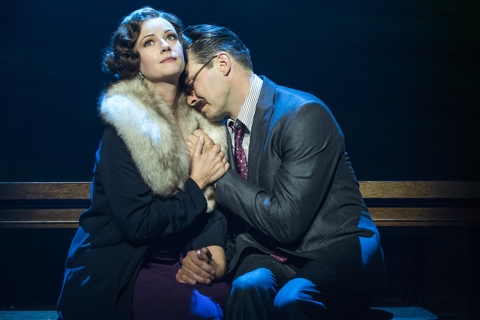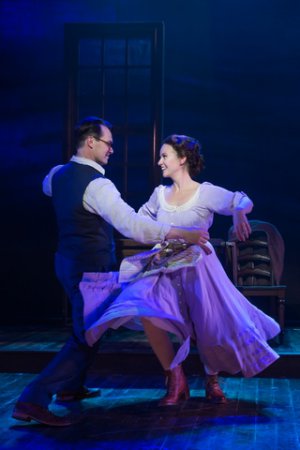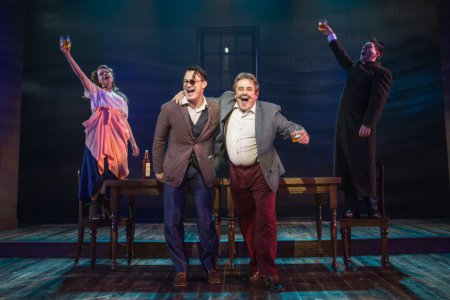Himself and Nora
A real-life love story between James Joyce and his muse, Nora, that inspired genius and obsession.

Whitney Bashor and Matt Bogart in a scene from “Himself and Nora” (Photo credit: Matthew Murphy)
[avatar user=”Cynthia Allen” size=”96″ align=”left” ] Cynthia Allen, Critic[/avatar]James Joyce most always put himself first, according to Jonathan Brielle, who wrote the book, music and lyrics for Himself and Nora, (subtitled “The Greatest Love Story Never Told”), Minetta Lane Theatre’s new Off-Broadway musical. Brielle explores the narcissistic and codependent 37-year relationship between James Joyce and Nora Barnacle (who later became Joyce’s wife). For a purported love story that defined a genius and mesmerized Joyce enthusiasts for ages, the two-act musical is lightweight with minimal literary biographical details.
Michael Bush directs a distinguished cast but doesn’t allow for the interplay of passion and lust to happen between Joyce and Nora. Both Matt Bogart (James Joyce) and Whitney Bashor (Nora) are capable actors and strong vocalists. However, a love for all time needs a particular chemistry, and this symbiotic attraction is lacking from the two actors.
The score is enticing, but conventional. The music adequately moves the story along through the ups and downs and creative turmoil of the distinguished Irish novelist. But there is more romp than depth to the songs — a homage more to Enya and pop Celtic songwriters, rather than music that haunts and captivates with decisive Joycean wit.

Matt Bogart and Whitney Bashor in a scene from “Himself and Nora” (Photo credit: Matthew Murphy)
Symbolically, the Priest (Zachary Prince) represents Irish Catholicism and what Joyce rebels against, as well as an iconic Ireland, but Bush’s direction of the Priest is the weakest link in the musical. Having the actor play the Priest with over the top bravado is an unfortunate choice. Lighting designer Jason Lyons chooses to depict the Priest as Joyce’s conscience in moments of isolated silhouettes. But in doing so, he gainsays the grip Catholicism holds on Joyce, and only adds to the Priest appearing as a fool. Coupled with Paul Tate dePoo III’s cumbersome set, neither design choice enhances the production.
When Brielle conveys the “why” of Joyce’s attraction to Nora — her simplicity of character, pride, confidence, and earthiness — his story comes alive. Nora is often remembered as a chambermaid, a simple girl, who worked at the Finn Hotel. However, biographers have been quick to point out that she was an intricate part of the hotel life, a respectable and central, watering hole around Trinity College. Nora often worked at Finn’s bar and her dynamic personality and competence was well-respected — a delight to the hotel customers. Brielle’s tunes “Compatriots in Lust” and “Stand Fast” capture her je ne sais quois and make evident the reasons why Nora stopped Joyce in his tracks.
Brielle maintains that Nora was much more than a muse and an object of lust. He suggests that Joyce appropriated some of Nora’s own words, particularly in writing his Ulysses, The Dead and Finnegan’s Wake. The scenes in which there are glimpses of when, where and how Joyce “borrowed” Nora’s words and used her as his muse are the most fascinating. The letters between the two, in particular, reveal the importance of her contributions. Her “dirty letters” were ribald and unlike any that Joyce had ever encountered, and he responded in kind. These letters achieved notoriety because of their erotic nature and they expressed James’ love in ways that stunned conventional society. Her use of language both inspired Joyce and kept him faithful to her when he was away for long periods of time. Brielle articulates the letters beautifully in song and story.

Lianne Marie Dobbs, Matt Bogart, Michael McCormick and Zachary Prince in a scene from “Himself and Nora” (Photo credit: Matthew Murphy)
Joyce saw Nora as the true voice of the country people of Ireland and particularly its women. Her pureness of the Irish spirit held him in his grasp for life. Brielle’s one song that comes closest to Joyce’s belief about the voice, the spirit Nora represented and the power Ireland had over him is his lovely “River Liffey.” Immediately after the song finishes with “Ireland, my Ireland, Home, Home Home,” Joyce says, “A lucky day for writing, Nora …. Nora, I discovered the sound of words add more to a page. The sound of words.” Would there be more poignant tunes like “River Liffey.”
The word “Himself” used in the title Himself and Nora not only emphasizes the importance of Joyce, first and foremost, but Himself also is used as a colloquial Irish term of endearment that portrays a couple that could not exist apart from each other. Himself and Nora is a real-life love story between James Joyce and his muse, Nora, that inspired genius and obsession, which would have been a more captivating musical play if the chemistry between the two actors worked.
Himself and Nora (through August 6, 2016)
Minetta Lane Theatre, 18 Minetta Lane, east of Avenue of the Americas, in Manhattan
For tickets, call 800-745-3000 or visit http://himselfandnoramusical.com
Running time: two hour and 15 minutes with one intermission






Leave a comment